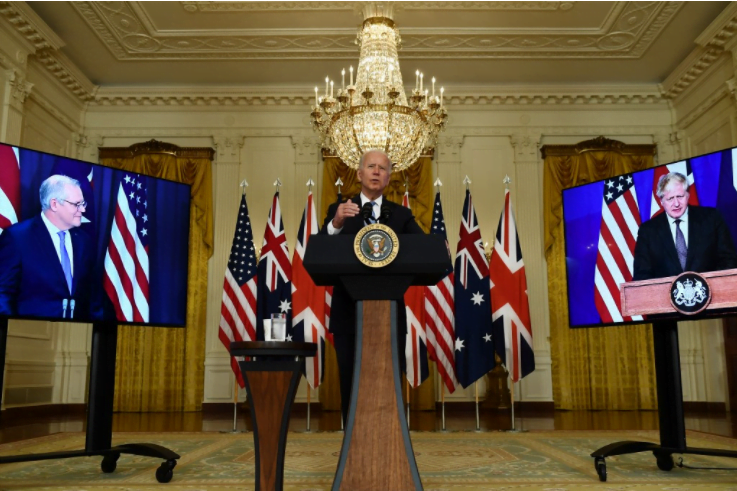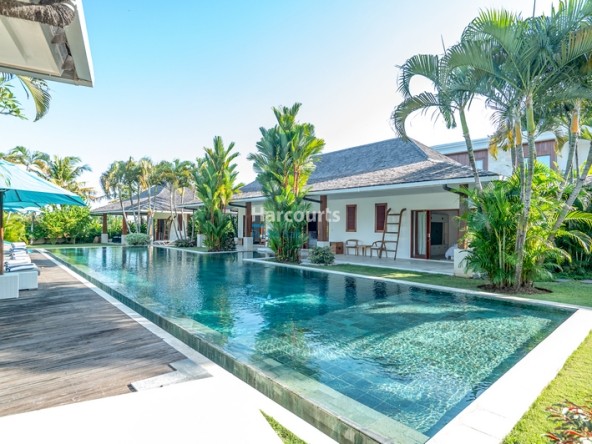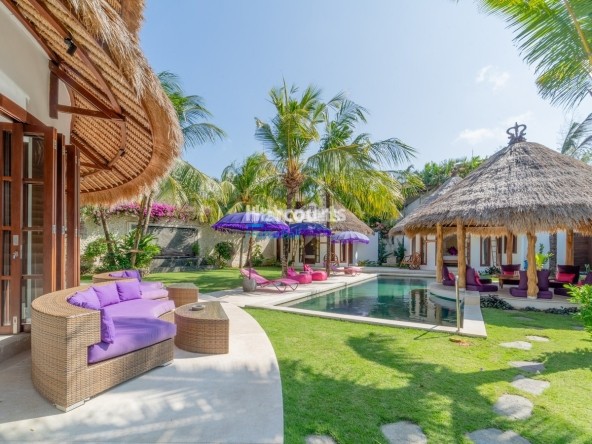United States President Joe Biden participates in a virtual press conference on national security with British Prime Minister Boris Johnson (right) and Australian Prime Minister Scott Morrison at the White House in Washington, DC, on Sept. 15, 2021. (AFP/Brendan Smialowski)
Dian Septiari (The Jakarta Post) Jakarta ● Sat, September 18, 2021
Indonesia on Friday reminded Australia of its regional obligation to maintain peace and stability after it set the pace of an Indo-Pacific arms race that is sure to heat up.
Thank you for reading this post, don't forget to subscribe!Canberra caught many countries in the region unawares this week after unveiling plans to acquire nuclear-powered submarines, as part of a new United States-led security pact that China has labeled as “extremely irresponsible”.
In a statement published on its website on Friday, the Foreign Ministry said Indonesia had cautiously taken note of Australia’s decision to acquire the submarines and stressed the importance of the country’s commitment to continue meeting its nuclear nonproliferation obligations.
“Indonesia is deeply concerned over the continuing arms race and power projection in the region,” the ministry said.
The ministry also beseeched Australia to uphold its commitment to regional peace, stability and security in accordance with the Treaty of Amity and Cooperation, a prerequisite for establishing ties with the 10-nation ASEAN.
The treaty requires its signatories to settle any disputes by peaceful means and renounce the threat or use of force in their engagements with one another. The US, China and the United Kingdom have also signed on.
“Indonesia encourages Australia and other parties concerned to advance dialogue in settling any differences peacefully,” the Foreign Ministry said.
“In this regard, Indonesia underscores the respect for international law, including the 1982 United Nations Convention on the Law of the Sea, in maintaining peace and security in the region.”
Jakarta’s warning came after Canberra unveiled a new defense pact with the US and the UK on Thursday, dubbed AUKUS, which has put countries in the region on edge. As part of the new arrangement, Australia will also acquire US cruise missiles, which massively upgrades its deploy and strike capabilities around the Indo-Pacific.
Experts note that middle power Australia has been known to take ASEAN’s position for granted, and even tried to undermine or bypass ASEAN in its diplomatic initiatives.
Indonesia, as the de facto leader of ASEAN and Australia’s closest neighbor, was informed of AUKUS’ launch at the last minute.
Chinese concerns
The move has worried ASEAN diplomats and has angered China, which has also been ruffling feathers in the South China Sea, a core theater of its rivalry with the US.
Since nuclear-powered submarines are quieter and could operate underwater for a longer period of time, defense analyst Curie Maharani predicted that China would be more vigilant in its incursions and ramp up intelligence gathering in and around Indonesia.
As an archipelagic nation that bridges the Indian and Pacific oceans, Indonesia oversees a number of sea lanes (ALKI) through which foreign vessels can seek passage.
In December last year, locals from Selayar island in South Sulawesi were surprised by the discovery of an unmanned underwater vehicle (UUV), thought to be of Chinese origin.
A month later, Indonesia’s Maritime Security Agency (Bakamla) intercepted a Chinese research vessel whose automatic tracking system had been deactivated on three separate occasions as it passed through the Sunda Strait.
Most recently, the Indonesian Navy deployed patrols around the Natuna islands in the Riau Islands province, after Chinese and US vessels were reportedly detected passing nearby in international waters.
Earlier this week, Kompas daily reported that a group of Indonesian fishermen were intimidated to find six Chinese vessels, including a warship, as they operated in the North Natuna Sea, which runs adjacent to the South China Sea.
However, Navy chief of staff Adm. Yudo Margono played down the concerns, saying that three Navy ships and an aircraft that patrolled the area did not find conclusive evidence that the vessels had entered territorial waters.
Yudo was the commander in charge during Indonesia’s weeks-long standoff with China in January 2020, which prompted President Joko “Jokowi” Widodo to visit the islands to assert Indonesia’s exclusive economic zone (EEZ) rights in the North Natuna Sea.
China does not claim the Natuna islands, but says it has nearby fishing rights within a self-proclaimed Nine-Dash Line that includes most of the South China Sea – a claim disputed by some Southeast Asian countries and not recognized internationally.
The US and its allies have consistently challenged China’s claims in the contested sea and its military buildup there.
Arms buildup
Experts say that China’s military expansion and the AUKUS launch are part of a larger arms race fueled by changing threat perceptions in the Indo-Pacific region.
China has dominated military spending in Asia, accounting for half of the continent’s total expenditures. But defense spending in Australia, India, Japan, South Korea and elsewhere are also gathering pace, AFP reports.
Indonesia and the UK announced on Friday that they are collaborating on the construction of a new Arrowhead-140 frigate, a warship designed for speed and maneuverability.
Defense Minister Prabowo Subianto and his British counterpart Ben Wallace witnessed the signing of the agreement in London, on Thursday.
“This is the first agreement of its kind for the ship, though other countries are likely to follow suit,” the UK Embassy in Indonesia said in a statement.
Senior research fellow at the Centre for Strategic and International Studies (CSIS), Rizal Sukma, insisted that Indonesia was not contributing to the arms race.
“We are just modernizing and replacing our outdated arsenal and filling the gaps based on the minimum essential forces program,” he told The Jakarta Post.
Rizal insisted that the buildup of defense capabilities are occurring across the board, including in patrolling needs as a means to safeguard Indonesia’s sovereign rights.
“We need more ships to patrol our waters, especially in dealing with illegal fishing. This includes the North Natuna Sea,” he said.



